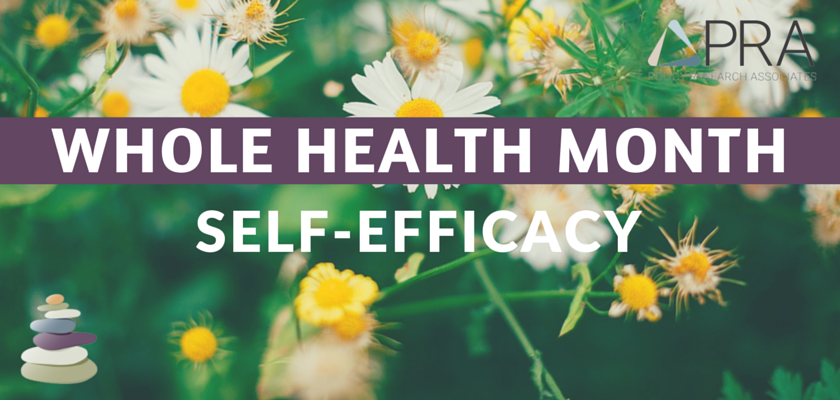I’m a health communication scholar, and I’m passionate about and intrigued by behavior change. This fascination was part of the impetus for my enrollment in a PhD program – thirsty for knowledge and expertise on the topic of behavior change, particularly as it relates to health and wellness.
One of the central tenets of several social and behavioral theories is the concept of self-efficacy Whether or not we think we can do something plays a huge role in whether or not we actually do it.
Take social cognitive theory, for example. Some key constructs are observational learning, reinforcement, and self-efficacy. Health belief model? Perceived severity, perceived benefits, perceived barriers, perceived susceptibility, cues to action, and self-efficacy. In the transtheoretical model, intentional behavior change is conceptualized as something that takes place in stages (pre-contemplation, contemplation, preparation, action, and maintenance). And, one of the factors that helps move people from one stage to the next is self-efficacy. In the theory of planned behavior, the very similar “perceived behavioral control” is a predictor of behavior change.
Self-efficacy is our perceived ability to perform a given behavior. And, it changes based on the behavior. My self-efficacy for eating three cups of vegetables each day might be high, but my self-efficacy for avoiding the cupcakes at an office party might be low.
Behavior change and the role of self-efficacy has been explored in countless areas, from weight loss and physical activity, to attending preventative doctor appointments and smoking cessation, to mental health and substance use.
If you think of the Eight Dimensions of Wellness, there might be areas you’d like to improve but feel like you can’t. Maybe developing effective coping skills just feels like something that can’t be done because you’ve developed the habit of using ineffective, or even unhealthy, coping skills. You can feel stuck and feel like making a change in that area just isn’t something you’re capable of doing.
Luckily, [social] science says there are ways to boost self-efficacy, and transform that “I can’t” attitude to a “can do” attitude. To be precise, there are four ways:
- Mastery Experience: Essentially, “Hey! I’ve done this before; I can do it again!” For example, re-entering the job market and going on an interview can be intimidating, but remembering past successful interviews can help boost self-efficacy. Or, if having a record of successful interviews isn’t there, doing mock interviews as a “training” can help show that it’s all under control.
- Vicarious Experiences: “Okay, I’ve never done this before, but look at her go!” For example, making new friends can be difficult as you get older, but having a well-developed support system doesn’t become any less valuable. A friend decides to join a group or a club to meet people, and shows just how easy it is. If that person can do it, I can do it.
- Verbal Persuasion: “Thanks for telling me you have confidence in me!” For example, committing to a new workout routine takes a lot of self-discipline. Having people support this decision and verbalize that confidence can boost self-efficacy.
- Physiological Feedback: “This feels good!” For example, taking time out of the day for diaphragmatic breathing feels good, mentally and physically, and boosts self-efficacy toward developing a regular conscious breathing or meditation habit.
So, when thinking about wellness, it’s important for us to keep in mind for ourselves and others that we can sometimes feel stuck and feel like we’re just not able to do something–quit smoking, cut down on sugar, take a walk, open a bank account, enroll in school, apply for a new job, or whatever the activity may be. But, we’re not stuck. We have low self-efficacy; and that’s just a perception, it’s not reality. We can engage in activities to improve wellness. And, since verbal persuasion is a means for boosting others’ self-efficacy, take time out of the day to remind people about how great they are! You never know – that could be the boost they needed to transform their wellness.


